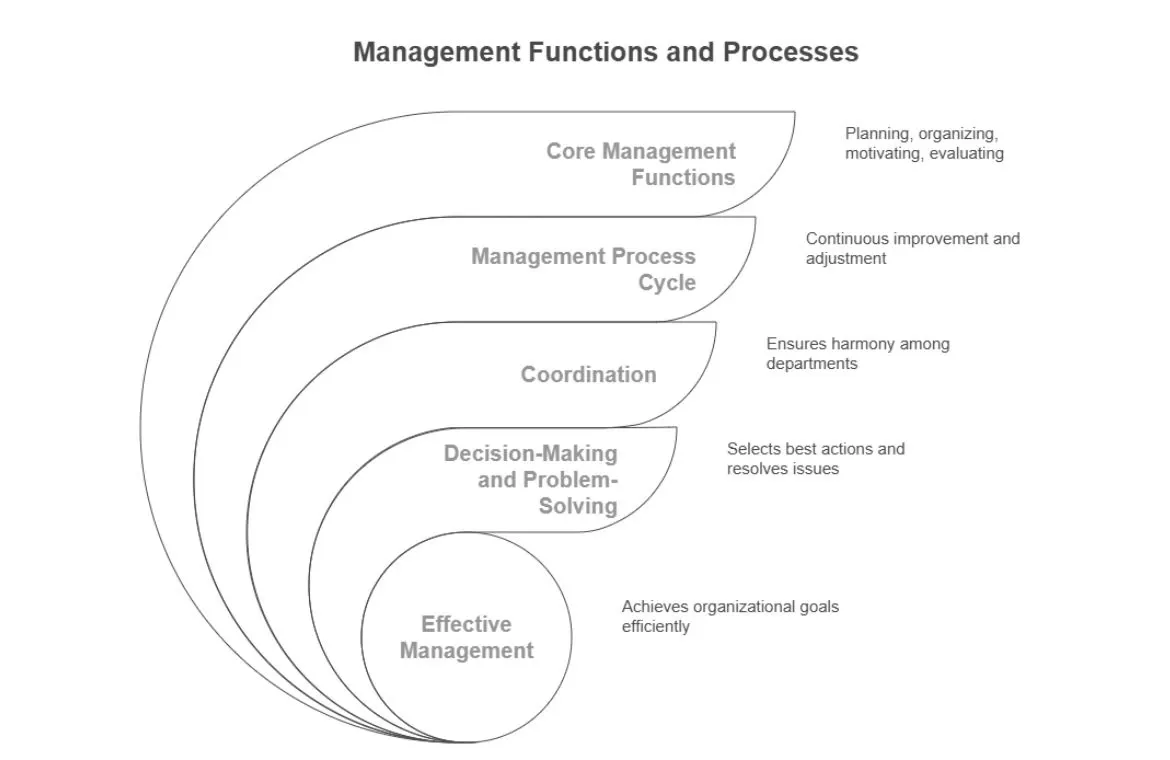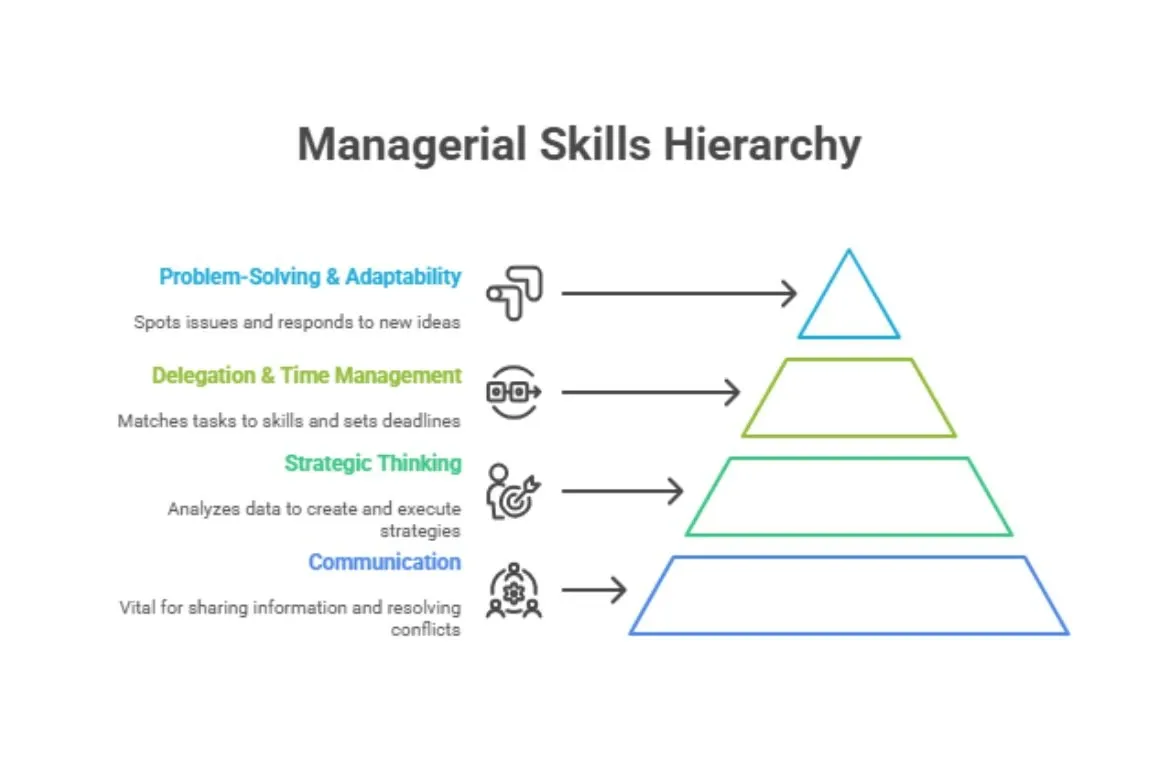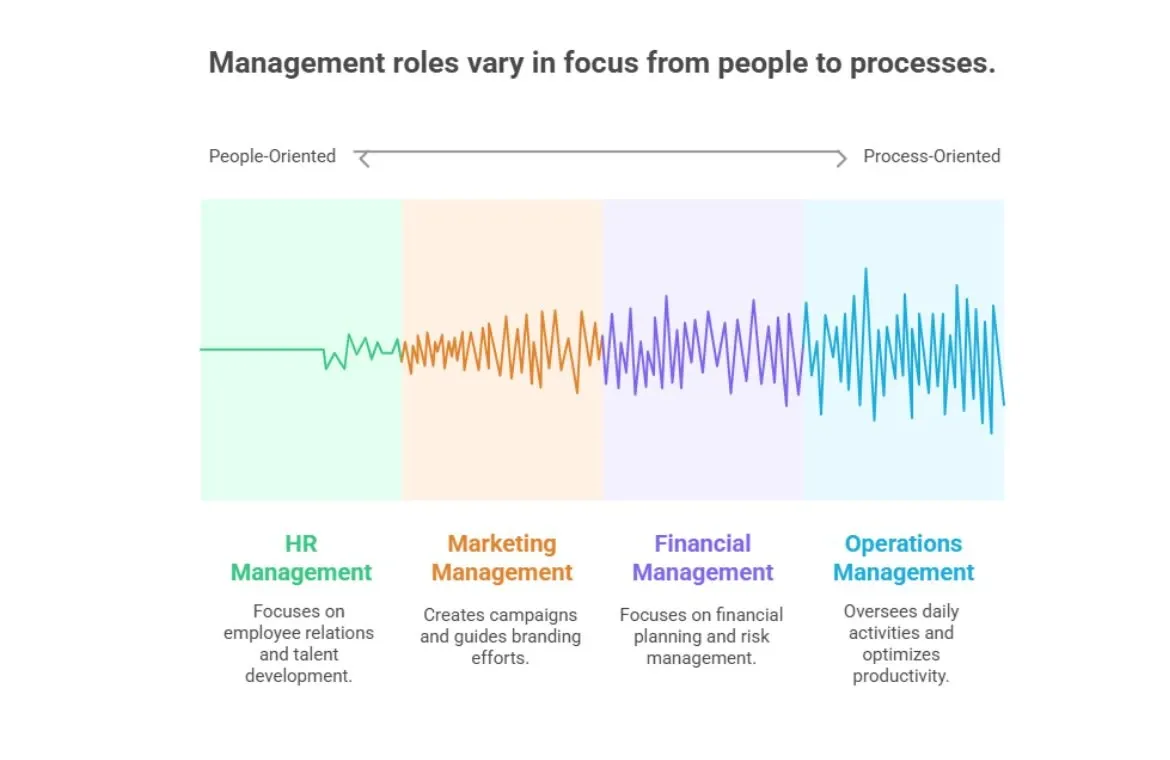What Is Management? Styles, Functions, Skills, and Careers

Management serves as the backbone of every successful organisation. It coordinates workflow, operations, and employees to meet company objectives. The role goes beyond operational tasks to cover strategic vision and leadership, making it vital for organizational success.
Management integrates people's work with organizational resources to achieve specific goals. Teams thrive in efficient, productive work environments created through management. Good management practices lead to increased efficiency and help businesses adapt to market changes.
What is Management?
Management refers to the process of coordinating and overseeing the work of others to achieve specific goals efficiently and effectively. It involves key functions like planning, organizing, leading, and controlling resources, such as people, time, money, and materials.
In simple terms, management is about making things happen through people. It ensures that tasks are done the right way, at the right time, using the right resources. Good management helps an organization run smoothly, grow sustainably, and adapt to change.
Why is management essential in organizations?
Management is the backbone of any successful business or organization for several compelling reasons. Good management aligns individual efforts with collective goals, and organizations without this alignment often fail to survive in competitive markets.
Management boosts productivity and efficiency by cutting costs and making the best use of resources. Managers smooth operations, remove bottlenecks, and use best practices that help businesses grow. This efficiency helps organizations achieve more with their people and materials.
Organizations need to adapt to today's ever-changing business world. A company's survival often depends on how well it responds to market changes. Managers help build teams that can quickly adjust when needed.
Management promotes team spirit and cooperation. It helps team members reach their personal goals while supporting overall success. This balance creates a workplace where employees feel valued and driven.
Who is a Manager, and What Are the Key Functions of a Manager?
A manager links an organization's strategic vision to its day-to-day operations. This section explores the people behind management processes and their significant responsibilities.

Planning and setting goals
Managers turn organizational objectives into action plans. They set specific targets and determine what needs to be done with available resources. A realistic timeline depends on finances, personnel, and resources. The economic climate, customer priorities, and competitive landscape can affect how these plans work.
Smart managers adapt their planning style based on different timeframes. They create long-term strategic goals for three years or more. Tactical planning covers the next year. Operational planning connects big-picture strategy to daily tasks.
Setting goals means breaking down tasks, creating measurable targets, and setting clear deadlines. Teams perform better when managers collaborate with employees on goals, which helps everyone see how their work fits into the bigger picture.
Organizing people and resources
Organization means putting the right resources, tasks, and people in the right places. Managers need to build formal structures and define everyone's role. They also create productive connections between departments. A good organization puts the right people in the right jobs. It ensures resources go where they're needed and work flows smoothly.
Key aspects of the organizing function include:
- Delegation of authority and responsibility
- Department structuring to focus on specific objectives
- Distribution of authority across management levels
- Coordination of employees across departments
Delegation is a vital skill that gives team members authority and responsibility. This makes organizations more flexible, enabling them to meet customer needs better and adapt to competition.
Motivating and leading teams
Leadership surpasses basic task management. It's about inspiring people to achieve organizational goals. Great managers build trust and communicate clearly, which creates positive work environments.
Studies show that motivated employees miss less work and get along better with management. Their performance improves, too. Motivation sparks innovation. Employees with can-do attitudes bring more creativity and imagination to their work.
Different teams need different leadership approaches. New employees might need more direction. Some benefit from coaching to build skills. Others need support to stay consistent. The most capable team members work best with a hands-off style.
Evaluating performance and outcomes
Managers track progress through the controlling function. They compare actual performance to standards and fix any problems they find.
Clear performance standards help organizations spot development needs. Managers can then give appropriate rewards and make smart decisions about promotions and career growth. Regular feedback keeps everyone on track.
How Does Management Function?
Understanding what management is and who managers are helps us learn how management actually functions and gives us practical insights into the mechanics that drive success.
The management process cycle
Management works as a continuous cycle rather than a one-time activity. This cycle includes planning, execution, review, and adjustment, a constant sequence that moves organizations forward. The cycle acts as the organization's backbone, with managers at every level participating. Each manager may expect different outcomes based on their position.
The process starts with strategic planning. Teams implement these plans, track results, and make needed adjustments before starting again. This keeps organizations flexible and ready to handle change. The basic goal stays the same at every management level: coordinating information and resources to meet organizational objectives.
This management cycle then creates systems that distribute information throughout the organization. A well-executed cycle links strategies properly, whatever the project's complexity. However, weak information-sharing plans can cause major setbacks. Even small communication gaps can disrupt entire projects.
Coordination across departments
Coordination makes different departments and groups work together toward common goals. It creates harmony between various tasks and activities, which helps achieve organizational objectives efficiently. Managers must take these steps to coordinate departments effectively:
- Create direct personal contact to solve misunderstandings and conflicts
- Build reciprocal relationships between departments
- Keep information flowing throughout the organization
- Build a climate of mutual cooperation
Companies of all sizes face challenges in coordinating their business units to maximize efficiency and profits. Each team's goals, strategies, and processes need to be properly arranged to ensure everyone works toward the same objectives.
Decision-making and problem-solving
Decision-making is the lifeblood of effective management. Adults make about 35,000 conscious decisions daily, with managers likely making even more. Managers select the best action from various options to reach organizational goals.
A structured decision-making approach follows seven key steps:
- Identify the needed decision
- Gather relevant information and evidence
- Identify possible alternatives
- Weigh evidence and evaluate options
- Choose the best solution
- Take action and implement the decision
- Review results and adjust as needed
Problem-solving brings many benefits to management. Teams work better together, workflows improve, projects finish faster, and work environments become more welcoming. Efficient problem-solving increases efficiency, boosts job satisfaction, and sparks creativity within departments.
Problem-solving starts with defining issues, finding root causes, implementing solutions, and maintaining results. Developing these critical skills helps managers navigate complexities and drive success in today's dynamic business world.
The Different Styles and Levels of Management
Organizations succeed when they have well-structured management and strong leadership approaches. Understanding hierarchical levels and various leadership styles can help you better direct workplace dynamics. This knowledge helps you adjust your approach based on your organization's needs, how your team works, and specific situations you face.
Top, middle, and first-line management
Management hierarchies work at three distinct levels, each serving unique organizational functions.
Top-level management includes executives like CEOs, COOs, CFOs, presidents, and board directors. These leaders create business plans, set goals, and build relationships with external entities. They carry the most authority and responsibility, and focus on long-term strategic vision instead of daily operations.
Middle-level management acts as a vital link between top executives and operational teams. Branch managers, department heads, and regional directors hold these positions. They apply top-level plans and turn strategic objectives into actionable blueprints. Their main focus is on carrying out senior management's plans while directing first-line managers with advice and performance evaluations.
First-line management (also called supervisory management) forms the foundation with team leads, supervisors, and section chiefs who oversee daily operations. These entry-level managers work directly with frontline employees. They assign tasks, maintain production quality, and solve operational challenges as they happen.
Authoritative vs. democratic styles
A leader's style substantially affects team dynamics and outcomes. Authoritative management keeps all decision-making power with the leader. This works well during emergencies that require quick decisions and when divided teams need clear direction. Leaders decide on their own and expect team members to follow through without much input. Though efficient in the short term, this approach might limit creativity and create resentment.
Democratic leadership shares decision-making between leaders and team members. This approach builds inclusive environments where employees help make decisions while leaders keep final authority. Leaders who use this style often ask for input and treat decision-making as a shared process. Teams usually produce better work, stay more engaged, and invent more through different points of view.
Coaching, visionary, and transformational styles
Several leadership styles have proven highly effective in modern workplaces. Coaching leadership helps develop individual team members through mentor-mentee relationships. These leaders give constructive feedback and help employees plan their careers. This style builds stronger communication, boosts personal development, and creates a supportive environment, perfect for long-term growth.
Visionary leadership connects teams with compelling long-term missions instead of controlling daily tasks. These leaders inspire creativity, motivate through purpose, and encourage teams to think differently. They state where the group should go without dictating the exact path, which gives freedom to experiment and create.
Transformational leadership inspires followers to exceed their perceived limits by putting the collective vision ahead of immediate self-interest. These leaders show four key behaviors: inspirational motivation, idealized influence, intellectual stimulation, and individualized consideration. This approach boosts follower motivation and job performance while building stronger commitment to organizational goals.
What Are the Managerial Skills?
"Anything and everything you can do to develop and learn management leadership skills as early as possible is critical because nobody's a born manager, and there aren't that many born leaders."

Strong managerial skills are the foundations of successful leadership. These core skills help managers motivate teams, implement strategies, and deliver business results, regardless of their industry or role level.
Communication and interpersonal skills
Communication is the most vital skill managers need to share information across their organization. Leaders must excel at different types of communication—they run meetings, deliver presentations, and help resolve employee conflicts. Good managers maintain eye contact, stay focused, and reflect back what others say to confirm they understand. They build trust through empathetic communication and make team members feel valued by encouraging them and recognizing their achievements.
Strategic thinking and decision-making
Strategic thinkers analyze data to create strategies, execute plans that meet company goals, and share results with stakeholders. This skill lets managers see the big picture of value creation in their organization and understand where they fit.
They balance current operations with future plans and keep both immediate needs and long-term vision in mind. Their decision-making abilities help them spot issues, weigh choices, and take firm action. Smart decisions save time, boost productivity, build trust, and reduce confusion at work.
Delegation and time management
Managers who know how to delegate enjoy less stress, more engaged employees, and higher workplace productivity. The key lies in matching tasks to team members' skills and giving them the authority they need to succeed. Time management works hand in hand with delegation. Managers prioritise projects, create task routines, and set achievable deadlines.
Problem-solving and adaptability
Problem-solvers spot issues, consider solutions, pick the best approach, and check if it works. The process starts with describing the problem, finding its root cause, developing options, and putting the best solution in place. On top of that, adaptable managers respond well to new ideas, duties, expectations, and strategies. They find different ways to lead teams, finish tasks, and tackle problems when obstacles pop up. This skill matters more than ever in today's fast-changing business world, where flexibility and resilience determine success.
How to Improve Managerial Skills?
Management excellence demands constant growth and time to reflect on your practices. First, you need to identify key leadership skills. Then comes the crucial part—finding the right ways to boost these abilities through well-laid-out methods.
Formal education and certifications
A solid foundation in management starts with formal education. business management courses teach new techniques that help you shape organizational processes better. Professional certifications are a great way to get benefits.
On-the-job learning and mentorship
Career development through on-the-job training stands as the oldest learning method. Employees learn useful skills right at their workplace. They pick up company tools and processes faster when they see visual demonstrations in their actual work setting.
Great managers often emerge through mentorship programmes. Organizations create positive learning environments by connecting experienced employees with newcomers. This encourages knowledge sharing and skill building. Strong mentorship programmes help train staff, plan succession, and preserve valuable company knowledge.
Feedback and performance reviews
Regular feedback speeds up manager development. Gallup research shows that team members who get weekly feedback are five times more likely to agree they receive meaningful input and three times more likely to feel motivated to do excellent work. Good feedback needs to be specific, timely, and action-focused. It should target progress toward company goals rather than personality traits.
Staying updated with trends and tools
Top managers always keep learning about industry changes. They read industry articles and research reports, attend conferences and webinars, and join professional groups. They set aside time to learn through books and online courses and follow industry leaders on professional platforms. They also join data summits and learn from online forums. This helps them build their knowledge and stay ahead in ever-changing business environments.
Career Opportunities in Management

Management careers are available in a variety of industries and create many opportunities for professionals with the right skills and qualifications. The management world continues to evolve and creates new paths for specialization in different business functions.
Marketing and sales management
Marketing and sales management roles remain top career choices for management professionals. Marketing managers create campaigns, study market trends, and guide branding efforts. Sales managers lead teams of sales associates and establish performance indicators.
The field has several roles to choose from. Product managers ensure the market success of products, while social media managers develop targeted content for specific audiences. Other career paths include marketing specialists, SEO specialists, and copywriters.
Project and operations management
Project and operations management professionals focus on simplified processes and better efficiency. Operations managers oversee daily activities in businesses, government agencies, and non-profit organizations. Their key tasks include productivity optimization, business forecasting, and cost control.
Project management roles exist in many sectors, from IT to construction and healthcare. Common job titles include "Programme Manager," "Project Management Office Manager," and "Technical Project Manager". Employers value candidates with certifications like Project Management Professional (PMP) or Certified ScrumMaster (CSM).
Finance and healthcare management
Financial management provides rewarding career paths. The field includes roles like financial analysts, financial planners, risk managers, and investment bankers. Healthcare management offers multiple career options.
Human resources and talent development
Human resources management involves recruitment, employee relations, and organizational culture development. Popular career paths include talent acquisition specialists and HR business partners.
HR professionals help organizations enhance learning, develop content strategy, and track investment returns. Talent development positions include learning managers, training coordinators, and people business partners. These roles implement flexible delivery models and use intelligent automation to improve talent management approaches.
Conclusion
Let's examine management fundamentals more closely. Good management surpasses simple supervision and includes strategic vision, thoughtful coordination, and purposeful leadership that transforms resources into meaningful outcomes.
Today's complex business world values management skills more than ever, so business management courses can be the right pathway to hone those skills and thrive in this field, as Adaptability has become a competitive edge. Understanding management principles boosts your professional value and opens doors to advancement, whatever your current role might be. Your management experience needs constant growth. Each step forward - through certifications, mentorship, or self-learning - adds real value to your career path.
Management styles come in many forms - authoritative, democratic, coaching, visionary, and transformational. You can adapt these approaches based on your team and situation. This flexibility, combined with strategic thinking, clear communication, and problem-solving, helps you succeed in business environments of all types.
Management excellence blends art and science. It requires technical knowledge and people skills. Great managers keep improving while focusing on both quick wins and future goals. Your steadfast dedication to management excellence propels your career forward and helps your organization and team grow.
Frequently Asked Questions
Q1. What is management style?
Management style refers to a manager's approach to leading, directing, and motivating a team. It shapes how decisions are made, communication flows, and goals are achieved, varying from authoritative to democratic or hands-off based on context and personality.
Q2. What is the management definition, types, skills, and careers?
Management is the process of planning, organizing, leading, and controlling resources to achieve goals. Types include strategic, operational, and people management. Key skills are leadership, communication, and problem-solving. Careers span roles in business, healthcare, education, and government sectors.
Q3. What are the seven main functions of management?
The seven main functions of management help organizations run smoothly and achieve their goals. They include:
- Planning: Setting objectives and outlining steps to reach them.
- Organizing: Arranging resources and tasks efficiently.
- Staffing: Hiring and developing the right talent.
- Directing: Guiding and motivating employees.
- Controlling: Monitoring progress and making adjustments.
- Coordinating: Ensuring all parts of the organization work together.
- Reporting: Communicating performance and outcomes to stakeholders.

TalentSprint
TalentSprint is a leading deep-tech education company. It partners with esteemed academic institutions and global corporations to offer advanced learning programs in deep-tech, management, and emerging technologies. Known for its high-impact programs co-created with think tanks and experts, TalentSprint blends academic expertise with practical industry experience.



